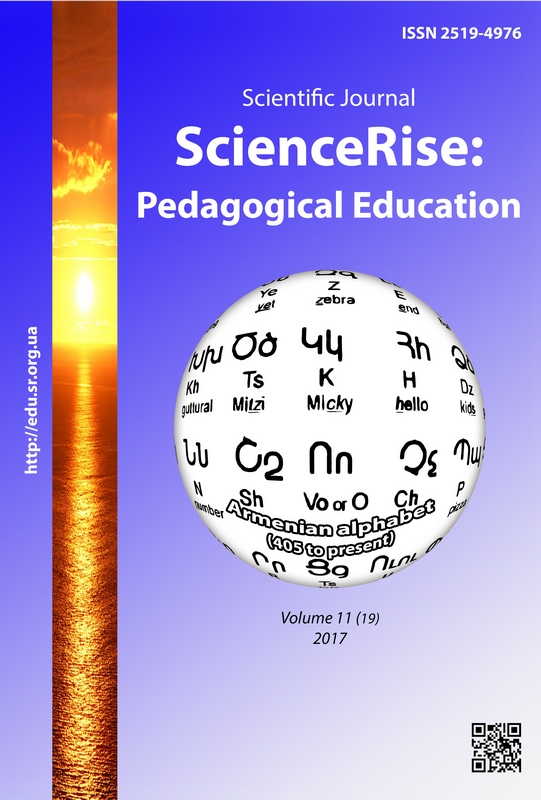The essence of the training targeted to bachelors of oriental studies at a pedagogical university
DOI:
https://doi.org/10.15587/2519-4984.2017.116541Keywords:
essence, training, professional, bachelor, oriental, studies, components, competence, pedagogical, universityAbstract
This article provides a thorough analysis of scientific and pedagogical literature that allowed acknowledging that various psycho-pedagogical and linguistic-methodical aspects of the training of future orientalists or oriental philologists have been the subject of scientific research. But the training specifics targeted to bachelors of Oriental Studies at a pedagogical university have stayed beyond scholars’ focus.
The goal of the article was to find out the essence of the training targeted to bachelors of Oriental Studies at a pedagogical university. To achieve the goal, these tasks were set and solved:
1. The issue on understanding the training nature by bachelors of Oriental Studies was actualized. A questionnaire survey of the bachelor students, majoring in Chinese and Turkish at the pedagogical university, assisted in concluding that they consider their training somewhat unilaterally, limitedly and incompletely.
2. The concept of professional training was investigated and it was found out that it is generally regarded as the one aimed at the mastering of knowledge, skills and abilities and it’s necessary for a person to perform his/her professional activity in general. Concerning bachelors of Oriental studies at a pedagogical university, it was discovered that their training is a process enabling formation of professional and pedagogical competence which determines the ability of a person to successfully solve complex specialized tasks and practical problems in teaching a certain discipline within Oriental Studies. There are taken into account the diversity of forms and socially determined patterns of behaviour, creative activity and levels of societies development, mainly Asian, in the context of the global interaction of cultures and civilization.
3. The education-and theory-centered, practice-and research-centered, personality-and reflexivity-centered, motivation-and value centered-components of the training targeted to bachelors of Oriental Studies at a pedagogical university were determined and characterized
References
- Slastenin, V. A. (1976). Pedagogicheskaya deyatel'nost' i problema formirovaniya lichnosti uchitelya: Psihologiya truda i lichnosti uchitelya. Moscow: MGPI, 1.
- Kurliand, Z. N. (1995). Profesiina ustalenist vchytelia – osnova yoho pedahohichnoi maisternosti. Odessa, 160.
- Bohdanova, I. M. (2003). Profesiino-pedahohichna pidhotovka maibutnikh uchyteliv na osnovi zastosuvannia innovatsiinykh tekhnolohii. Kyiv, 439.
- Oskina, N. O. (2016). Professional training of a bachelor of oriental studies at a pedagogical university. Science and Education, 10, 34–38. Available at: http://nbuv.gov.ua/UJRN/NiO_2016_10_8
- Lynenko, A. F. (1996). Teoriia i praktyka formuvannia hotovnosti studentiv pedahohichnykh vuziv do profesiinoi diialnosti. Kyiv, 44.
- Asadchykh, O. V. (2006). Linhvokomunikatyvnyi metod: pryntsypy analizu eksperymentalnoho uroku na materiali yaponskoi movy. Naukovyi chasopys Natsionalnoho pedahohichnoho universytetu im. M. P. Drahomanova: Aktualni problemy suchasnoho movoznavtsia. Kyiv: Znannia Ukrainy, 84–88.
- Dovbnia, K. V. (2006). Strukturuvannia zmistu navchalno-metodychnoho-kompleksu dlia maibutnikh fakhivtsiv–skhodoznavtsiv. Materialy konferentsii Kharkivskoho natsionalnoho universytetu im. V. N. Karazina. Kharkiv, 46–49.
- Nesterova, O. A. (2016). Professional'nye kompetentsii v sfere razrabotki i realizatsii sovremennykh kul'turnykh strategiy. Credo new, 3 (87), 1–13.
- Balabanova, H. P. (2001). Pro perspektyvy skhodoznavstva v Ukraini. Ukraina – krainy Skhodu: vid dialohu pedahohichnykh system do dialohu kultur ta tsyvilizatsii. Kyiv, 3–6.
- Bastun, M. V. (2005). Osobystisnyi pidkhid u doprofesiinii pidhotovtsi uchniv himnazii z vyvchenniam skhidnykh mov. Kyiv, 21.
- Braginskiy, I. S. (1974). Problemy vostokovedeniya: Aktual'nye voprosy vostochnogo literaturovedeniya. Moscow: Nauka, 493.
- Mukhamedzhanova, V. A. (1976). Tekst i ego rol' v protsesse obucheniya yazyku urdu na mladshikh kursakh vostochnogo fakul'teta. Vostokovedenie. Voprosy filologii i metodiki prepodavaniya vostochnykh yazykov, 507, 63–66.
- Psikhologo-pedagogicheskiy slovar' dlya uchiteley i rukovoditeley obshheobrazovatel'nykh uchrezhdeniy (1998). Rostov-on-Don: Izdatel'stvo «Feniks», 544.
- Novyy entsiklopedicheskiy slovar (2010). Moscow: Izdatel'stvo „Ripol Klassik”, 2144.
- Pedagogika: Bol'shaya sovremennaya entsiklopediya (2005). Minsk: Sovremennoe slovo, 720.
- Kuzminskyi, A. I., Omelianenko, V. L. (2007). Pedahohika. Kyiv: Znannia, 447.
- Fedyna, V. S. (2009). Formuvannia profesiinoi kompetentnosti u maibutnikh fakhivtsiv-skhodoznavtsiv. Kyiv, 22.
- Zakon Ukrainy “Pro vyshchu osvitu” (2002). Osvita Ukrainy, 17, 2.
- Buheria, T. M. (2013). Osoblyvosti ta sutnist profesiinoi pidhotovky maibutnikh uchyteliv osnov zdorovia. Fizychne vykhovannia, sport i kultura zdorovia u suchasnomu suspilstvi, 4, 25–29.
- Zdanevych, L. (2013). Sutnist i struktura profesiinoi pidhotovky maibutnoho vykhovatelia do roboty z dezadaptovanymy ditmy doshkilnoho viku. Hirska shkola Ukrainskykh Karpat, 8-9, 59–63. Available at: http://nbuv.gov.ua/UJRN/gsuk_2013_8-9_20
- Bohdanova, I. M. (2016). Sutnist pidhotovky maibutnikh sotsialnykh pratsivnykiv do profesiinoi diialnosti v umovakh rekreatsii. Nauka i osvita, 10, 58–63. Available at: http://nbuv.gov.ua/UJRN/NiO_2016_10_12
Downloads
Published
How to Cite
Issue
Section
License
Copyright (c) 2017 Nataliia Oskina

This work is licensed under a Creative Commons Attribution 4.0 International License.
Our journal abides by the Creative Commons CC BY copyright rights and permissions for open access journals.
Authors, who are published in this journal, agree to the following conditions:
1. The authors reserve the right to authorship of the work and pass the first publication right of this work to the journal under the terms of a Creative Commons CC BY, which allows others to freely distribute the published research with the obligatory reference to the authors of the original work and the first publication of the work in this journal.
2. The authors have the right to conclude separate supplement agreements that relate to non-exclusive work distribution in the form in which it has been published by the journal (for example, to upload the work to the online storage of the journal or publish it as part of a monograph), provided that the reference to the first publication of the work in this journal is included.








